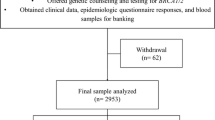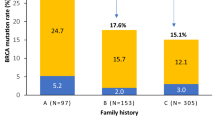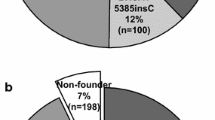Abstract
Information on the prevalence of deleterious BRCA1 and BRCA2 (BRCA1/2) mutations in clinic-based populations of Black women is limited. In order to address this gap, we performed a retrospective study to determine the prevalence of deleterious BRCA1/2 mutations, predictors of having a mutation, and acceptance of risk-reducing surgeries in Black women. In an urban unselected clinic-based population, we evaluated 211 self-identified Black women who underwent genetic counseling for hereditary breast–ovarian cancer syndrome. BRCA1/2 mutations were identified in 13.4 % of the participants who received genetic testing. Younger age at diagnosis, higher BRCAPRO score, significant family history, and diagnosis of triple-negative breast cancer were associated with identification of a BRCA1/2 mutation. Of the affected patients found to have a deleterious mutation, almost half underwent prophylactic measures. In our study population, 1 in 7 Black women who underwent genetic testing harbored a deleterious BRCA1/2 mutation independent of age at diagnosis or family history.

Similar content being viewed by others
References
Bauer KR, Brown M, Cress RD (2007) Descriptive analysis of estrogen receptor (ER)-negative, progesterone receptor (PR)-negative, and HER2-negative invasive breast cancer, the so-called triple-negative phenotype: a population-based study from the California cancer Registry. Cancer 109(9):1721–1728
Kwan ML, Kushi LH, Weltzien E et al (2009) Epidemiology of breast cancer subtypes in two prospective cohort studies of breast cancer survivors. Breast Cancer Res 11(3):R31. doi:10.1186/bcr2261
Peshkin BN, Alabek ML, Isaacs C (2010) BRCA1/2 mutations and triple negative breast cancers. Breast Dis 32(1–2):25–33
Young SR, Pilarski RT, Donenberg T et al (2009) The prevalence of BRCA1 mutations among young women with triple-negative breast cancer. BMC Cancer 9:86. doi:10.1186/1471-2407-9-86
Atchley DP, Albarracin CT, Lopez A et al (2008) Clinical and pathologic characteristics of patients with BRCA-positive and BRCA-negative breast cancer. J Clin Oncol 26:4282–4288
Couch FJ, Hart SN, Sharma P et al (2015) Inherited mutations in 17 breast cancer susceptibility genes among a large triple-negative breast cancer cohort unselected for family history of breast cancer. J Clin Oncol 33:304–311
Althuis MD, Brogan DD, Coates RJ (2003) Breast cancers among very young premenopausal women (United States). Cancer Causes Control 14(2):151–160
Pal T, Bonner D, Kim J et al (2013) Early onset Breast Cancer in a Registry-based sample of African-American women: BRCA mutation prevalence, and other personal and system-level clinical characteristics. Breast J 19(2):189–192
John EM, Miron A, Gong G et al (2007) Prevalence of pathogenic BRCA1 mutation carriers in 5 U.S. racial/ethnic groups. JAMA 298(24):2869–2876
Malone KE, Daling JR, Doody DR et al (2006) Prevalence and predictors of BRCA1 and BRCA2 mutations in a population-based study of breast cancer in white and black American women ages 35 to 64 years. Cancer Res 66(16):8297–8308
Haffty BG, Silber A, Matloff E et al (2006) Racial differences in the incidence of BRCA1 and BRCA2 mutations in a cohort of early onset breast cancer patients: African American compared to white women. J Med Genet 43:133–137
Nanda R, Schumm LP, Cummings S et al (2005) Genetic testing in an ethnically diverse cohort of high-risk women: a comparative analysis of BRCA1 and BRCA2 mutations in American families of European and African ancestry. JAMA 294(15):1925–1933
Hall MJ, Reid JE, Burbidge LA et al (2009) BRCA1 and BRCA2 mutations in women of different ethnicities undergoing testing for hereditary breast-ovarian cancer. Cancer 115(10):2222–2233
Judkins T, Rosenthal E, Arnell C et al (2012) Clinical significance of large rearrangements in BRCA1 and BRCA2. Cancer 118(21):5210–5216
Greenup R, Buchanan A, Lorizio W et al (2013) Prevalence of BRCA mutations among women with triple-negative breast cancer (TNBC) in a genetic counseling cohort. Ann Surg Oncol 20(10):3254–3258
National Comprehensive Cancer Network Inc. NCCN Clinical Practice Guidelines in Oncology (NCCN Guidelines®). Genetic/Familial High-Risk Assessment: Breast and Ovarian. Version 2.2015. www.nccn.org/professionals/physician_gls/pdf/genetics_screening.pdf, Accessed 8 July 2015
Stuckey A, Febbraro T, Laprise J, et al (2014) Adherence patterns to National Comprehensive Cancer Network Guidelines for referral of women with breast cancer to genetics professionals. Am J Clin Oncol 2014 [Epub ahead of print]
Pal T, Bonner D, Cragun D et al (2014) BRCA sequencing and large rearrangement testing in young Black women with breast cancer. J Commun Genet 5(2):157–165
Stoppa-Lyonnet D, Laurent-Puig P, Essioux L et al (1997) BRCA1 sequence variations in 160 individuals referred to a breast/ovarian family cancer clinic. Institut Curie Breast Cancer Group. Am J Hum Genet 60(5):1021–1030
Shatavi SV, Dohany, L, Chisti MM, et al. (2013) Unique genetic characteristics of BRCA mutation carriers in a cohort of Arab American women. J Clin Oncol 31, (suppl;aabstr 1541)
Eggington JM, Burbidge LA, Roa B, et al (2012) Current variant of uncertain significance rates in BRCA1/2 and Lynch syndrome testing (MLH1, MSH2, MSH6, PMS2, EPCAM) American College of Medical Genetics and Genomics annual meeting, Charlotte
Ricker CN, Sturgeon JD, Gruber SB (2014) Mutation and uncertain variant findings in ethnic minority patients undergoing multi-gene panel testing for cancer risk assessment at a safety-net public hospital (Abstract 3428S). Presented at the 64th Annual Meeting of the American Society of Human Genetics, on October 2014 in San Diego
LaDuca H, Stuenkel AJ, Dolinsky JS et al (2014) Utilization of multigene panels in hereditary cancer predisposition testing: analysis of more than 2,000 patients. Gene Med 16(11):830–837
Tung N, Battelli C, Allen B et al (2015) Frequency of mutations in individuals with breast cancer referred for BRCA1 and BRCA2 testing using next-generation sequencing with a 25-gene panel. Cancer 121(1):25–33
Schwartz MD, Isaacs C, Graves KD et al (2012) Long-term outcome of BRCA1/BRCA2 testing: risk reduction and surveillance. Cancer 118(2):510–517
Bradbury AR, Comfort NI, Dignam JJ et al (2008) Uptake and timing of bilateral prophylactic salpingo-oophorectomy among BRCA1 and BRCA2 mutation carriers. Genet Med 10:161–166
Kinney AY, Simonsen SE, Baty BJ (2006) Risk reduction behaviors and provider communication following genetic counseling and BRCA1 mutation testing in an African American kindred. J Genet Couns 15:293–305
Salant T, Ganschow PS, Olopade OI (2006) ”Why take it if you don’t have anything?” breast cancer risk perceptions and prevention choices at a public hospital. J Gen Intern Med 21:779–785
Thompson HS, Sussner K, Schwartz MD et al (2012) Receipt of genetic counseling recommendations among black women at high risk for BRCA mutations. Genet Test Molec Biomark 16(11):1257–1262
Halbert CH, Brewster K, Collier A et al (2005) Recruiting African American women to participate in hereditary breast cancer research. J Clin Oncol 23(31):7967–7973
Glenn BA, Chawla N, Bastani R (2012) Barriers to genetic testing for breast cancer risk among ethnic minority women: an exploratory study. Ethn Dis 22(3):267–273
Susswein LR, Skrzynia C, Lange LA et al (2008) Increased uptake of BRCA1/2 genetic testing among African American women with a recent diagnosis of breast cancer. J Clin Oncol 26:32–36
Sussner KM, Edwards TA, Thompson HS et al (2011) Ethnic, racial and cultural identity and perceived benefits and barriers related to genetic testing for breast cancer among at-risk women of African descent in New York City. Public Health Genomics 14(6):356–370
Armstrong K, Putt M, Halbert CH et al (2012) The influence of health care policies and health care system disrupt on willingness to undergo genetic testing. Med Care 50(5):381–387
Affordable Care Act Implementation FAQs–Set 12. http://www.cms.gov/CCIIO/Resources/Fact-Sheets-and-FAQs/aca_implementation_faqs12.html. Accessed on April 15 2015
Churpek JE, Walsh T, Zheng Y et al (2015) Inherited predispostion to breast cancer among African American women. Breast Cancer Res Treat 149(1):31–39
Heikkinen T, Kärkkäinen H, Aaltonen K et al (2009) The breast cancer susceptibility mutation PALB2 1592delT is associated with an aggressive tumor phenotype. Clin Cancer Res 15(9):3214–3222
Antoniou AC, Casadei S, Heikkinen T et al (2014) Breast-cancer risk in families with mutations in PALB2. N Engl J Med 371(6):497–506
Acknowledgments
We thank the following genetic counselors who saw the patients who participated in this study (besides TD and BNP): Rachel Nusbaum MS, CGC, Gillian Hooker PhD, MS, and Morgan Similuk, MGC, CGC. We thank the endowed Jess and Mildred Fisher Center for Hereditary Cancer and Clinical Genomics Research, and Genentech for the grant received for genetic counseling and testing.
Funding
This study was supported by the Familial Cancer Registry and Nontherapeutic Subject Registry Shared Resource at Lombardi Comprehensive Cancer Center, and was partially supported by the National Institutes of Health Grant P30-CA-51008. Study data were collected and managed using REDCap electronic data capture tools hosted at Georgetown University Medical Center. Ms. Peshkin and Dr. Isaacs received support from the endowed Jess and Mildred Fisher Center for Hereditary Cancer and Clinical Genomics Research.
Author information
Authors and Affiliations
Corresponding author
Ethics declarations
Conflict of interest
The authors declare that they have no conflict of interest.
Rights and permissions
About this article
Cite this article
Lynce, F., Smith, K.L., Stein, J. et al. Deleterious BRCA1/2 mutations in an urban population of Black women. Breast Cancer Res Treat 153, 201–209 (2015). https://doi.org/10.1007/s10549-015-3527-8
Received:
Accepted:
Published:
Issue Date:
DOI: https://doi.org/10.1007/s10549-015-3527-8




